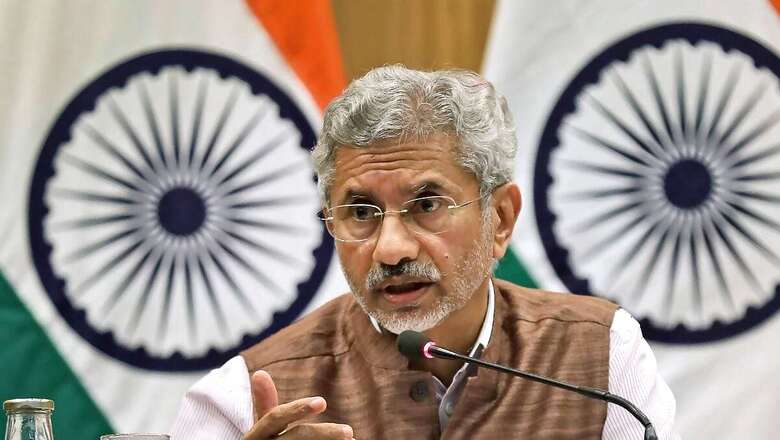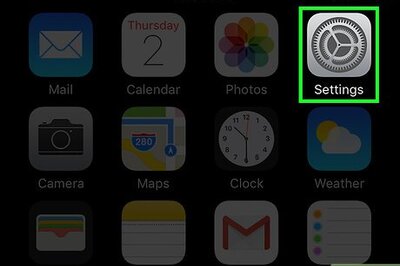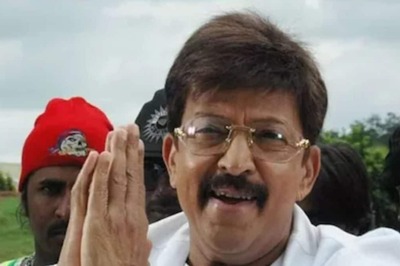
views
External Affairs Minister S Jaishankar is on a two-day visit to Iran from Monday where he will discuss with his Iranian counterpart Hossein Amir-Abdollahian a range of key issues including the unfolding security situation in the Red Sea.
The Ministry of External Affairs (MEA) said the two ministers will deliberate on bilateral, regional and global issues.
Jaishankar’s planned visit to Tehran comes against the backdrop of growing global concerns over Houthi militants targeting merchant vessels in the Red Sea amid the Israel-Hamas conflict.
Began my engagements in Tehran by meeting Minister of Roads and Urban Development @mehrdadbazrpash. Detailed and productive discussion on establishing a long-term cooperation framework with respect to Chabahar port. Also exchanged views on the International North-South… pic.twitter.com/mDBxfHV690
— Dr. S. Jaishankar (@DrSJaishankar) January 15, 2024
New Delhi’s role in this tense situation is pertinent given its closeness to Iran, which has backed the Houthi rebels.
Houthis Threat in Red Sea
Yemen’s Iranian-backed Houthi militants, who control much of Yemen, have launched wave after wave of exploding drones and missiles at Western commercial vessels in the Red Sea since November 19. The rebels have repeatedly targeted ships in the Red Sea, saying they were avenging Israel’s offensive in Gaza against Hamas.
But they have frequently targeted vessels with tenuous or no clear links to Israel, imperilling shipping in a key route for global trade.
The US and the UK have already launched air strikes targeting the Houthi positions in Yemen. The first day of US-led strikes on Friday hit 28 locations and struck more than 60 targets with cruise missiles and bombs launched by fighter jets, warships and a submarine.
But on Sunday, Houthi rebels fired an anti-ship cruise missile toward an American destroyer in the Red Sea, which was shot down by a US fighter jet.
The Houthis have targeted that crucial corridor linking Asian and Mideast energy and cargo shipments to the Suez Canal onward to Europe over the Israel-Hamas war.
How it is Impacting India?
While the Houthis attack did not impact India initially, it is now affecting India both directly and indirectly. Amid the Houthi strikes on commercial vessels, several ships bound for India have also come attack.
Recently, Liberian-flagged vessel MV Chem Pluto, with 21 Indian crew members, came under drone attack off India’s west coast. One more commercial vessel bound for India came under a drone strike in the Red Sea on the same day, according to Livemint.
It has also impacted India’s trade relations with other countries. RBB Ship Chartering, a company dealing with ship chartering services, has said that shipping costs have multiplied significantly, according to The Economic Times.
Red Sea remains a significant shipping route for India as goods traded to the US East Coast, Europe, and Middle East pass through it. A substantial number of commodities, including steel, engineering goods, textiles, chemicals, vehicles and agro-products exported from India to Europe and the West via the Red Sea route. As per report, the Indian exports could drop by 6.7 per cent this financial year due to the crisis.
India has been closely monitoring the unfolding situation in the Red Sea. The issue figured in a phone conversation between Jaishankar and US Secretary of State Antony Blinken last week.
The Indian Navy has already enhanced deployment of its frontline ships and surveillance aircraft for maritime security operations in view of the maritime environment in the critical sea lanes including the North and Central Arabian Sea. Following the airstrikes targeting the Houthi positions, US President Joe Biden said he will not hesitate to direct further measures.
Chabahar port on Agenda
Union Minister Jaishankar and Iranian counterpart Amir-Abdollahian are also likely to deliberate on boosting regional connectivity through the Chabahar port.
Located in Sistan-Balochistan province on the energy-rich Iran’s southern coast, the Chabahar port is being developed by India and Iran to boost connectivity and trade ties. India has been pushing for the Chabahar port project to boost regional trade, especially for its connectivity to Afghanistan.
At a connectivity conference in Tashkent in 2021, Jaishankar projected the Chabahar port as a key regional transit hub, including to Afghanistan. The Chabahar port is also seen as a key hub for the INSTC project.
The International North-South Transport Corridor (INSTC) is a 7,200-km-long multi-mode transport project for moving freight among India, Iran, Afghanistan, Armenia, Azerbaijan, Russia, Central Asia and Europe.
Foreign Secretary Vinay Kwatra visited Tehran in November to co-chair a meeting of India-Iran Foreign Office Consultations (FOC) along with Iranian Deputy Foreign Minister for political affairs, Ali Bagheri Kani.
(With inputs from agencies)

















Comments
0 comment